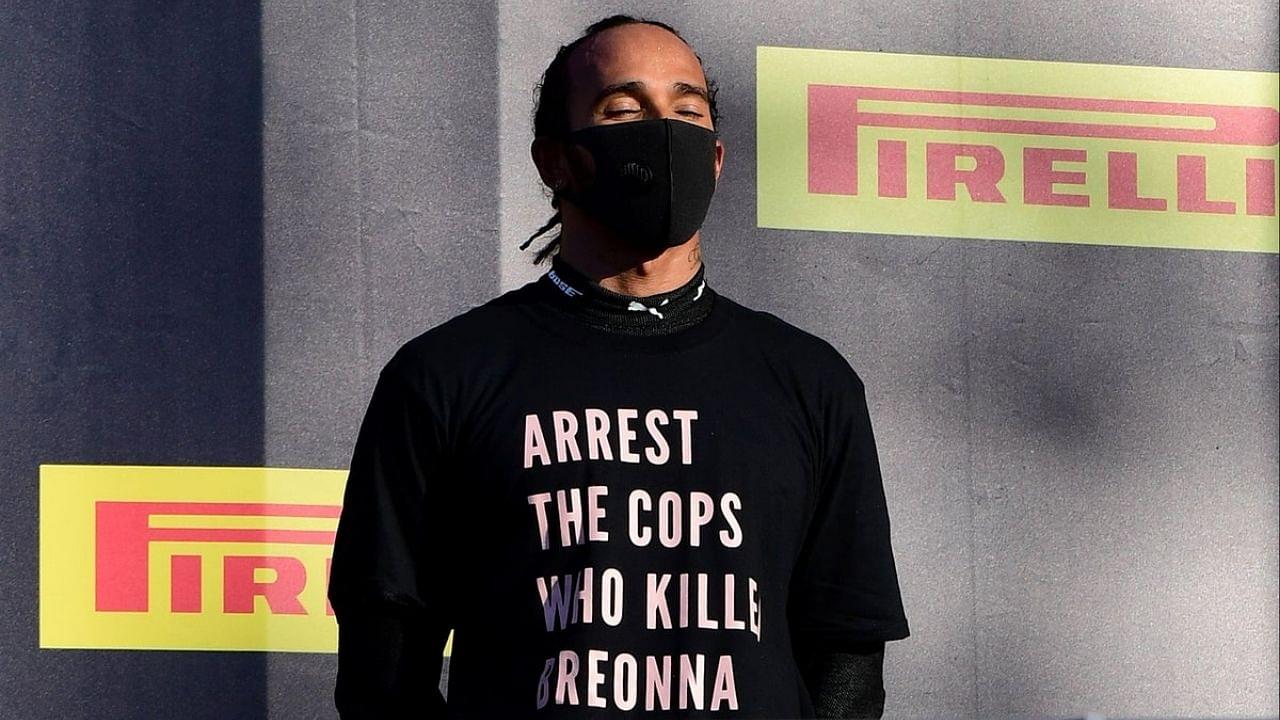Lewis Hamilton is the biggest face in F1 today. The Mercedes driver is also the only black face in a driver’s seat in all of F1’s decades-long history.
Speaking with Wall Street Journal, the Seven-time World Champion shed some light on his dream to change F1 for the better. Hamilton’s burning passion for the Black Lives Matter movement first came out properly in Mugello in 2020 when he wore a T-shirt asking the killers of Breonna Taylor to be arrested on the podium.
The chaotic race at Mugello proved to be a challenge for the Seven-time World Champion, but he was determined to win. “I can’t be second,” he recalled to WSJ Magazine. “I’m wearing that shirt – I’ve got to get to first to bring light to her name.
“I get these nerves like, ‘Shoot, I’m about to break the rules and people aren’t going to be happy with it’,” he added. The FIA immediately made a new rule to ensure something like this doesn’t happen again when he did. The directive from FIA Race Director Michael Masi stated:
“For the duration of the podium ceremony and post-race interview procedure, the drivers finishing the race in positions 1, 2, 3 must remain attired only in their driving suits, ‘done up’ to the neck, not opened to the waist.”
Speaking about this, Hamilton shrugged and said: “They’ve changed a lot of rules after a lot of things that I’ve done.”
.@LewisHamilton reacts to the verdict on Breonna Taylor’s case. pic.twitter.com/btMj2lADbN
— ESPN F1 (@ESPNF1) September 24, 2020
Lewis Hamilton furious with lack of support
The British driver realised the lack of diversity in the sport in 2019 when he saw a picture on Instagram in 2019 of his team celebrating his sixth World title. “I zoomed in on them, from the F1 Instagram,” he said. “I’ve been here 15 years, 14 years—how has it not changed? I was really sad about it. I was frustrated and sad.”
Even though Hamilton had taken a knee earlier, he felt that the movement was still very much on the surface level and met too much resistance.
“I saw people continuing in my industry and staying quiet,” said the defending champion. It reminded Him of the abuse he heard when he first came up in Formula 1.
At the start of the 2021 season, 10 drivers took a knee while the other 10 didn’t. Hamilton did not take it personally, although he did find some allies in the new generation joining the sport. Particularly Mick Schumacher. Among the veterans, Sebastian Vettel too openly expressed his support.
Also read: Lewis Hamilton speaks on Sebastian Vettel publicly expressing views on current social issues
Lewis Hamilton’s mission for an inclusive F1
While other teams and drivers may not have given Hamilton the reaction he’d have hoped for, one place he refused to take ‘no’ for an answer was within Mercedes itself.
Hamilton spoke with sponsors and held them accountable. Speaking with Monster Energy’s CEO, he asked them: “Where are you guys at? How are you guys holding yourself accountable? How can we work together?”
He revealed that if they had not supported his move towards inclusivity in the team, he would have discontinued working with them.
Also read: Lewis Hamilton ready to drop his F1 privileges if it helps him to make a better world
Lewis has even set up the Hamilton Commission Report, which is determined to determine why black children are given lesser opportunities than other children, among other questions.
Hamilton aims at getting more children from underprivileged and underrepresented backgrounds in the field of engineering and science. Dr Hayaatun Sillem, who led the Hamilton Commission Report, had this to say: “There is this focus on ‘we hire the best, we want the best, that’s all that matters to us,’. You don’t have to see it in such a binary way. That’s a false choice.”
“You can be a meritocracy, but you can recognise that people’s ability to access and thrive in that meritocracy is influenced by all sorts of personal characteristics.”
The Mercedes driver concluded by sharing what he thought was a higher purpose earmarked for him in the sport. “I’m 36 years old; I’ve been wondering, Why me? Why am I the only Black driver that’s got through to Formula 1, and not only that—I’m at the front? There’s got to be a bigger reason for me being here.”






